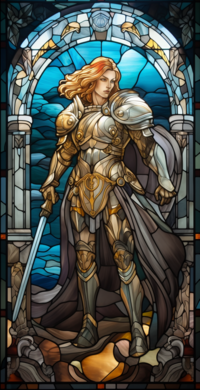Myrmidia
Myrmidia is the Human goddess of honourable war, civilisation,, strategy, soldiers, and officers in the Old World Pantheon. Her worship has spread into the Empire from the southern lands of Tilea and Estalia in the Old World, where she is also known as the goddess of vengeance, beauty, art and honour. She is also revered as the "Queen of Muses" and "Mother of Invention."
Myrmidia acts as the patron deity of both the Estalian kingdoms and the Tilean city-states, and is fanatically worshipped in both of those realms. Because of this, the Cult of Myrmidia is the largest in the Old World, for all it has a limited presence in the Empire.
Myrmidia embodies the civilised tactics and strategies of warfare in comparison to the barbaric savagery of Ulrican warriors and the fanatical zeal of the Sigmarites. Hers is the domain of tactics, formation and strategy, the order within the chaos that is the battlefield. Myrmidia does not favour brute force or mindless bloodshed. She is patron of the art and science of war, who recognises both the elegance of single-combat and the sweeping vision of grand strategy.
She rewards those who fight their wars with honour. She endorses the pursuit of wisdom in warfare and inspires commanders with tactical brilliance on the battlefield, and individual fighters with quick-witted swordplay.
Myrmidia is also the patron of the cunning ruse and well-timed ambush, but she is not a cruel goddess. The defeated enemy must be granted clemency if they submit and captured towns and cities must be spared the ravages of sacking. She grants victory to the honourable but is the staunch nemesis of hubristic conquerors who visit woe upon the vanquished.
Myrmidia is reported by some sacred texts to once have walked the earth clad in mortal flesh. She is a goddess from the Classical age of ancient Tilea, depicted as the daughter of Verena and Morr, and is said to have been given to mortal parents as a child. At this point she was, like her sister Shallya, a pacifist. Sacred texts claim that when Myrmidia, as a mortal woman, was born, her parents died early and she had to live with her aunt and uncle. Both treated her poorly and forced her to work from dawn till dusk. Eventually, they sold her off to a local lord, under whom she suffered many indignities before killing him with a ceremonial spear.
Myrmidia would allegedly grow into a warrior maiden and rally the people of the southern Old World against all enemies. Tileans claim she was born in Remas and conquered Estalia, while the Estalians claim she was born in Magritta and conquered Tilea. Regardless of which version is true, she united the southern civilisations. The day she was crowned queen of the southern realms, however, she was assassinated. When Myrmidia lay dying from her wounds, she ordered a great ship be built, and, it is said, sailed west upon it, there to return to her home amongst the gods, known now, and forever after, as a goddess of war.
The similarity between Myrmidia and the rise of Sigmar sparked heavy religious controversy in the Empire. The southern people claimed that Myrmidia, in contrast to Sigmar, had always been a god that had chosen to incarnate herself in the mortal world to better know the ways of Men, in contrast to Sigmar who was born as a man and later ascended to godhood during his life. Heresies appeared that claimed that Sigmar had been a god as well before and was actually the son of Ulric. The Cult of Sigmar tried to quell these stories, but they proved a popular myth.
